INTRODUCTION
The Honorable Society of King's Inns (King's Inns) is the Irish ‘Inn of Court’, training and admitting legal professionals who wish to be awarded the degree of Barrister-at-Law necessary to be called to the Bar by the Chief Justice of Ireland. Established in 1541, King's Inns is Ireland's oldest school of law, and as well as educating future barristers, offers a range of part-time courses including the Diploma in Legal Studies and Advanced Diplomas in specialist areas of the law.
The aim of King's Inns library is to facilitate the delivery of professional legal education by supporting the current teaching and learning needs of King's Inns. In many ways the library operates as an academic library, offering an in person and virtual enquiry desk service, a study space for students with WiFi, a reference and lending collection, access to online resources including the main legal databases, and training. However, the library also has an important responsibility in caring for a significant historic collection.
The King's Inns library is a private members library, our user community extends beyond the primary student cohort to all subscribing members of King's Inns including Benchers and practising barristers. We also extend access, on request, to members of the wider academic community who wish to consult unique items held in the library or archive collection. The working day can incorporate a range of activities from negotiating with suppliers to delivering online training to searching through our manuscript Guard Catalogues to locate a 19th Century work on Irish flora.
HISTORY OF KING'S INNS
King's Inns was founded in Dublin in 1541, during the reign of Henry VIII, following a petition by judges and senior common lawyers to the King for a lease on the land and property, originally occupied by the Friars Preachers (Dominicans), confiscated by the crown following the dissolution of the monasteries. The property was located alongside the River Liffey where the Four Courts now stand. The Inns appears on the first published map of Dublin, drawn by John Speed in 1610, and the thoroughfare is still called Inns Quay. The society was founded, following the model of the inns in London, to provide accommodation and a place for lawyers to meet and dine. The functions of King's Inns have since been extended, now formally encompassing education, regulation, and administration; however, the tradition of dining continues.
Despite the establishment of the Irish inn, there was still a requirement for prospective lawyers to study at one of the English Inns of Court, a necessity which remained until 1885 and may go some way towards explaining why the introduction of formal legal education to King's Inns was delayed until 1850 and possibly why an official library took some time to get established.
ESTABLISHMENT OF KING'S INNS LIBRARY
The library collection originated in 1788 when the Benchers purchased a portion of the library of the late Mr Justice Christopher Robinson. The initial selection included an assortment of law books on civil, canon, equity and common law.
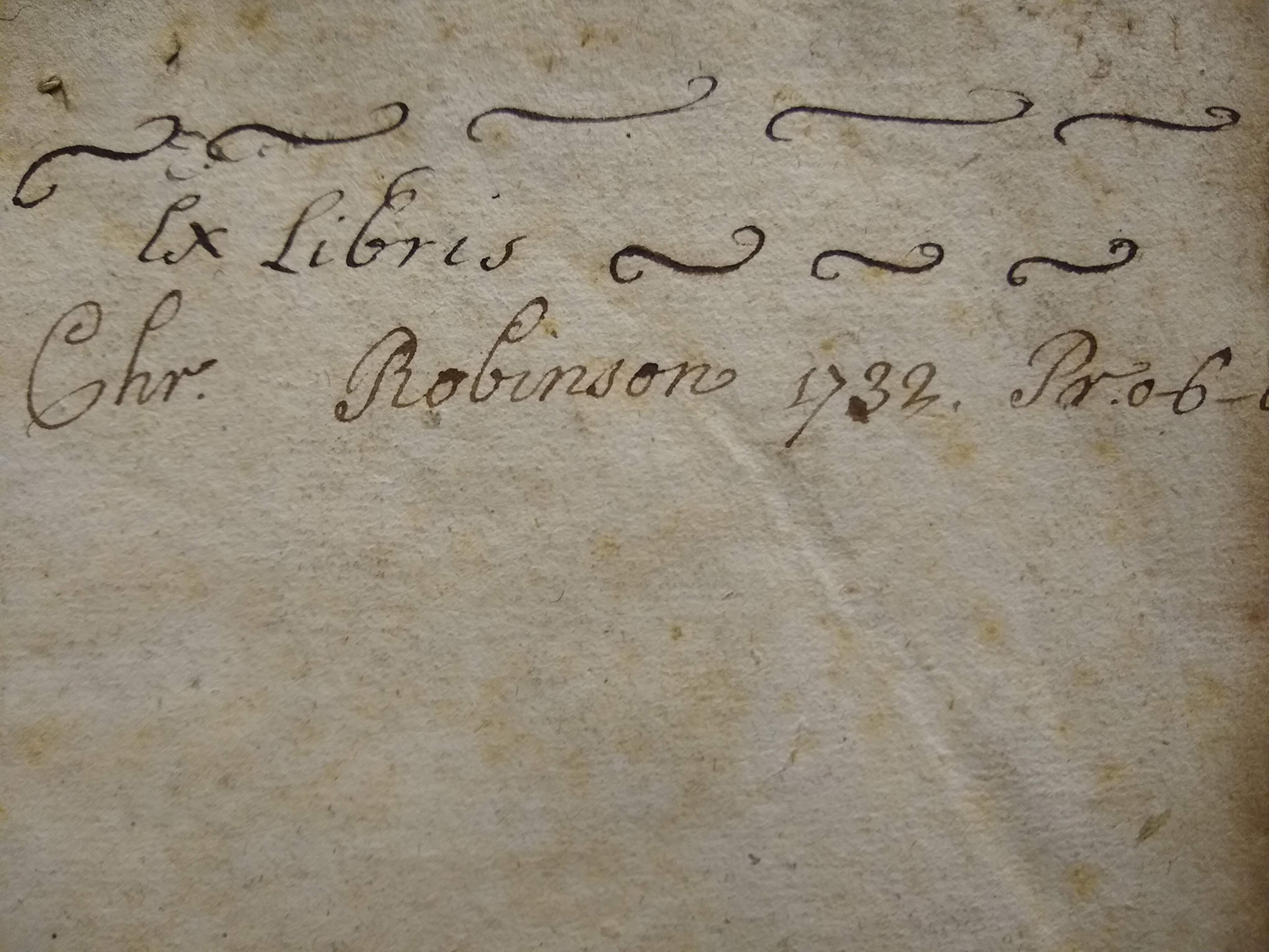
The signature of Mr Justice Christopher Robinson taken from the 1628 printing of Sir Edward Coke, First part of the Insitutes of the lawes of England. Or A commentarie upon Littleton
It appears from extant records that the first librarian, George Hart, was appointed by January 1792 and succeeded by Stephen Dickson in November 1793. Bartholomew Duhigg was appointed as deputy librarian in 1794. Duhigg left a legacy of writings on the King's Inns and was responsible for many significant additions to the collection including the pamphlet collection.
When the first books were acquired, they were initially stored in boxes in the basement of Four Courts, the society's premises having fallen into disrepair and been acquired by the government for the construction of the new law courts. Over the next 20 years the collection was without a permanent home as the society moved between locations.
The collection was further enhanced with the passing of the Copyright Act 1801 (41 Geo. III c.107), which extended copyright to Ireland and gave the libraries of Trinity College Dublin and King's Inns the right to a free copy of every new book and reprint entered at Stationer's Hall. This privilege was revoked by later legislation, namely An Act to repeal so much of an Act of the Fifty-fourth Year of King George the Third, respecting Copyrights, as requires the Delivery of a Copy of every published Book to the libraries of Sion college, the Four Universities of Scotland, and of the King's Inns in Dublin (6 & 7 Will. IV c.110). However, the privilege was converted to the payment of a small annual sum which continued until 2002.
In the late 18th Century final government plans to establish a court building on the quays no longer provided for accommodation for King's Inns. Over turbulent periods in Irish history the society had both fallen into abeyance and been revived more than once since its inception. At this juncture, following various progressions including the granting (and immediate revocation) of a Royal Charter in 1792, the society had moved from a moribund to active phase. The Benchers acquired land on Constitution Hill with a view to building their new premises, and appointed James Gandon as architect. Gandon's original plans included a hall, library, and quadrangle surrounded by chambers; much of the original plans remain unrealised. On 1 August 1800, the Lord Chancellor, the Earl of Clare, laid the first stone of the hall and library. By 1804 the structure of the hall wing was almost complete, however with society funds exhausted the second wing remained unfinished. The library collection acquired a further temporary home with a move to what is now the Benchers’ Room in the completed wing. In 1813 it was agreed that the unfinished library wing should be sold to the Commissioners of Public Records for use as a record office. Today this wing remains in state ownership and is home to the Registry of Deeds / Táilte Éireann.
KING'S INNS LIBRARY BUILDING
Space for a library was still required and in 1822 a decision was taken to build a purpose-built library on Henrietta Street, on the site of the town house of Richard Robinson, former primate of Armagh. The new library building was designed by Frederick Darley. Work began in 1826, it opened to members in 1832, and is where the library is located today. The building was designed in the Greek Revival style and is reputed to have included the first Greek Doric Portico in Dublin. The plain exterior, built exclusively of granite, belies the fine interior.
The Library Building is three storeys over a basement and was originally seven bays wide. The Reading Room is on the first floor and the original plans describe the ground floor rooms as ‘librarians apartments’. An 1851 entryFootnote 1 provides a more detailed description of the librarian's accommodation as ‘the two rooms and dressingroom on the ground floor… and the kitchen and servants room adjoining the larder and pantry in the basement … together with the stable and coach house.’ Today's librarian commutes by bicycle and the ground floor rooms are used as administrative offices.
The Reading Room is a beautiful space. A fine example of a Greek Revival interior it spans the length and depth of the building and is of double height. There are seven bays of bookshelves on each side, supporting a Gallery surrounded by a decorative cast iron balustrade. The room is lit by 14 north facing windows, one of which is stained glass incorporating the coats of arms of Benchers, and eight south facing windows. The ceiling has a large stucco centrepiece. More architectural detail and description can be found in A Favourite Study: Building the King's Inns by Patricia McCarthy.
Each bay is a double bay, and most bays have 13 shelves of books. Law books occupy approximately half the Reading Room, with the non-law collection occupying the remainder of the shelves. Many of the higher shelves are smaller in size, holding 16mo or 12mo books, which over the years has resulted in books being shelved by size rather than subject. Ladders of varying heights are scattered throughout the room for staff use. The library furniture, with cast iron supports and mahogany tops, was designed by Robert Mallet from the firm of J & R Mallet, Ryder's Row, Dublin. These tables are still in situ, albeit with the addition of lights and power sockets for today's readers.

The Reading Room of King's Inns Library
By the mid 1880s additions to the collection meant that all available space for books had been used and architect James Franklin Fuller was asked to provide a solution. This resulted in the construction of a six-storey annexe in steel and stone which was added as an extension to the building in 1892. Each of these storeys has 14 double sets of shelves. Access to many of the storeys is by way of a spiral staircase only. This provides a practical challenge when manoeuvring stock, one perhaps not foreseen when a previous staircase connecting the Reading Room and Gallery was removed.
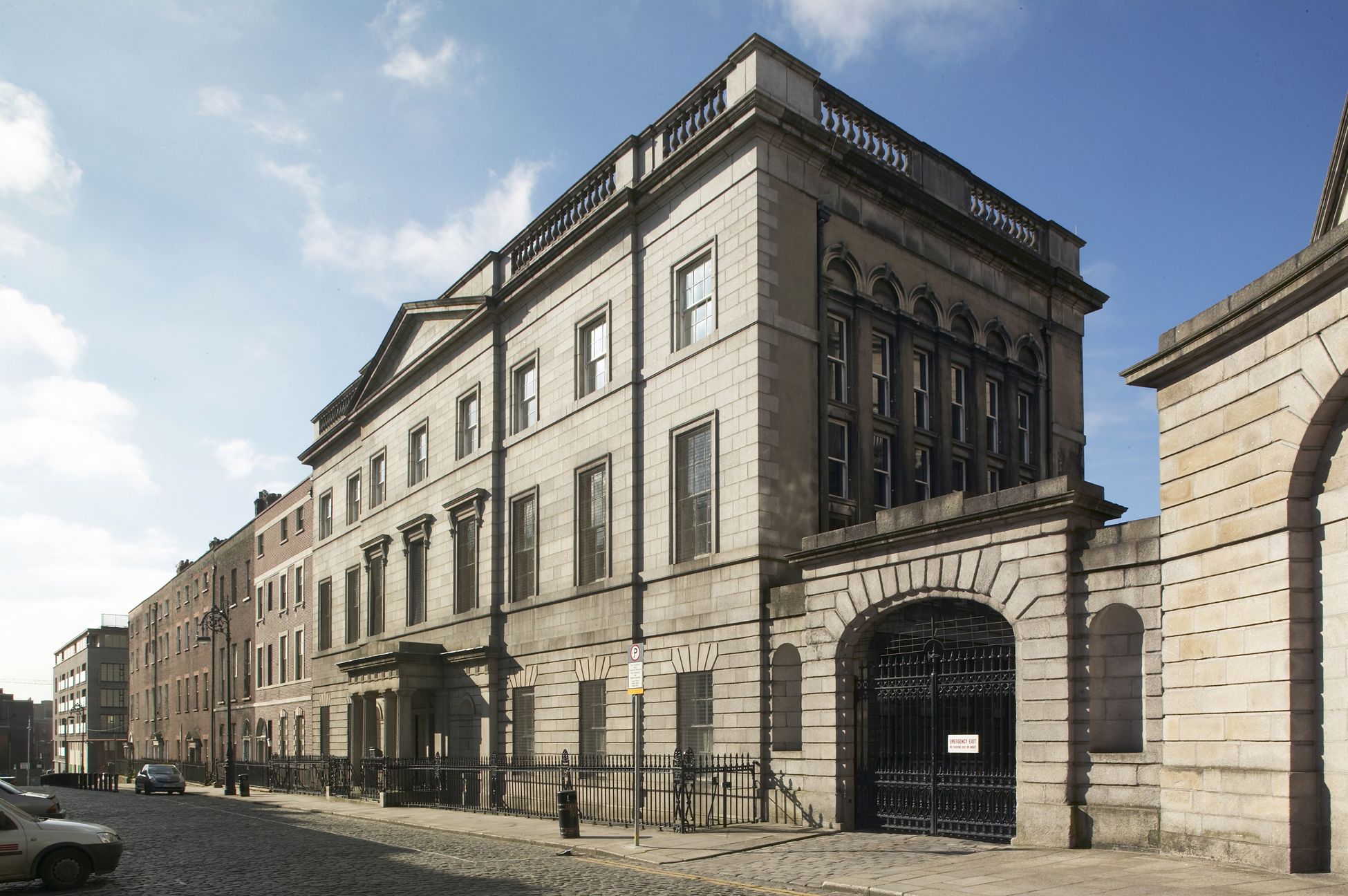
King's Inns Library Building on Henrietta Street, showing the 1892 annexe
Today's collection is housed in the Reading Room, the Gallery, the annexe and in basement bookstores with compact mobile shelving to maximise storage. A small section of the collection is stored in a strong room for security and to minimise fluctuations in temperature and relative humidity. Space remains at a premium.
COLLECTION
King's Inns print collection consists of approximately 110,000 volumes, about half of which are law books. The collection is divided between law and non-law, and it has been the policy since the 1970s to actively add to the law collection only. The non-law collection is developed only by way of acquisition of material which informs or assists in the interpretation of certain parts of the historical collection, or material unique to King's Inns or to the institution and members of King's Inns.
The print law collection consists of legislation, law reports, legal journals, and texts. The primary focus is on Irish material to support current teaching practices, supplemented and enhanced by materials from other common law jurisdictions and the European Union. Through the online subscription resources students have access to an extensive range of national and international law reports, journals, and commentary, including e-books, for legal research purposes. The law print and online collection have been strengthened in areas where new courses have been launched including law and education, corporate crime, and data protection.
The holdings of legal historical material held by King's Inns are an invaluable resource. In addition to early works on Roman and canon law, over time the library has collected nearly all the Irish and, most of the English, seminal law texts. Historically the holdings included most areas of practice, however, in recent times, with the growth of legal publishers and publishing, the focus of collection development is aligned to areas of law taught by the school of law. It remains library policy to retain one copy of a superseded edition of all legal textbooks. These superseded editions are frequently referred to and consulted by practising barristers and members of the judiciary when there is a requirement to unravel the application of laws over time. In addition, the law collection includes a set of Parliamentary Papers (1802-1919), Journals of the Irish House of Commons (1613-1800), a 97-volume set of Irish Appeals to the House of Lords, and local and personal acts from 1801 to 1921.
During the pandemic the opportunity was taken to upgrade the catalogue records of over 300 volumes of law tracts and trials, many with a handwritten contents list, improving their findability with a sequence of volume numbers.
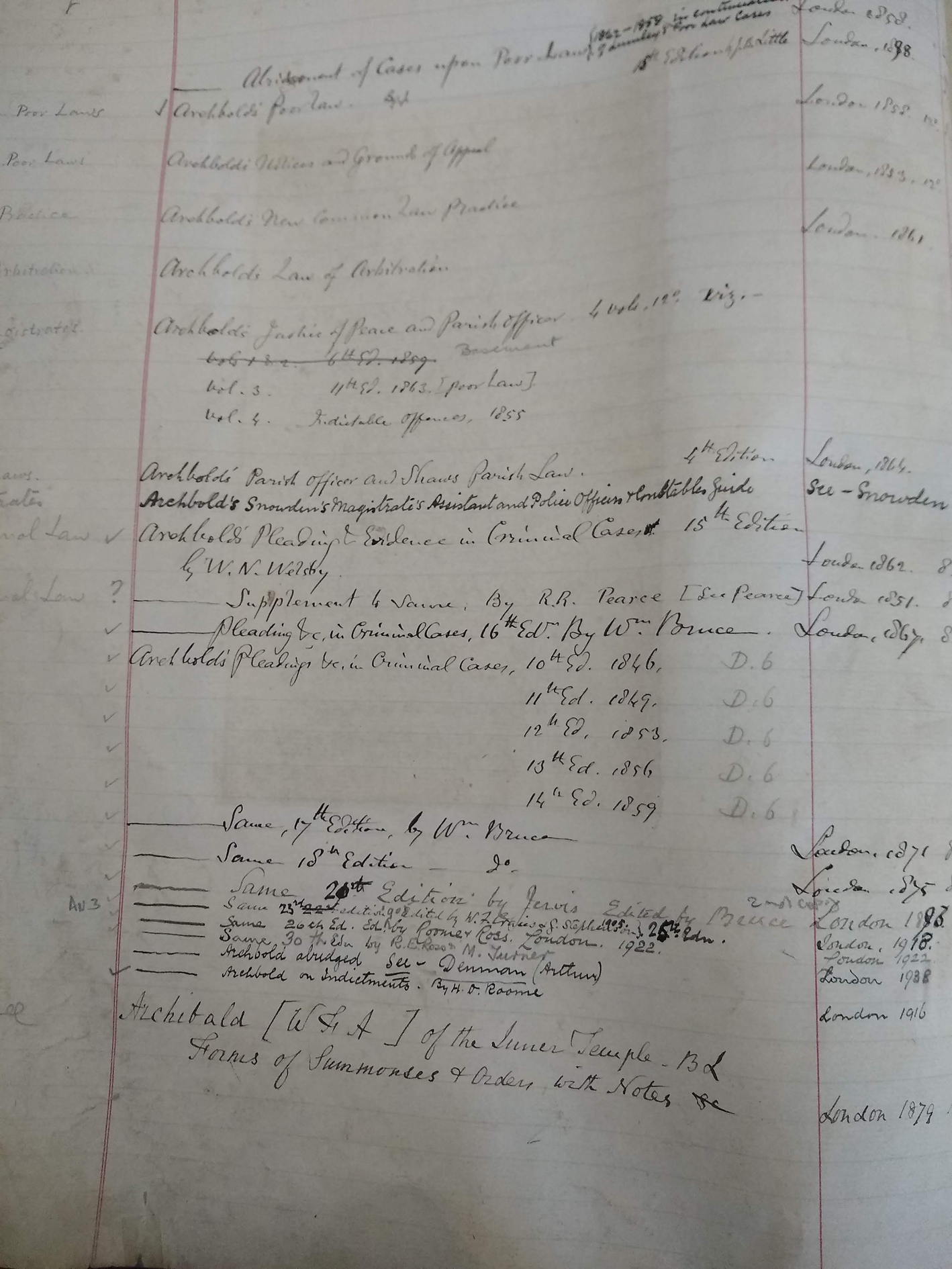
Handwritten contents of law tracts
THE NON-LAW COLLECTION
As half of the space in the Reading Room is currently dedicated to the non-law collection, when tours are given, sweeping statements as to the contents of each bay are indicated by a wave of a hand. In reality, as mentioned previously, the size of a volume has played a role in the location of material. On the Reading Room floor there are bays dedicated to Irish history, European history, British history, heraldry, literature and literary criticism. Some of these bays also include law reports or law journals. Collection management can often seem like a jigsaw puzzle or occasionally a game of Jenga. The wooden shelves are long fixed in place and generally the only movement possible is a gentle bowing in the middle due to the load. On the Gallery, which has shelving all around the walls, are holdings in other languages, including some French, Spanish, Italian and German literary works. There is an entire wall dedicated to Classics, a further section of dictionaries (including Fijian and Cornish) and etymologies. One of the basement bookstores holds texts on art as well as religion.
It is always a delight to come across a work with beautiful illustrations by artists including Harry Kernoff, Pauline Bewick and Harry Clarke. A very small number of works on the natural sciences remain in the collection following the controversial disposal of some of the holdings in 1972.Footnote 2 Among the special collection holdings are a Second Folio and Fourth Folio Shakespeare, 17 incunabula, and a collection of over 7000 pamphlets from the 17th and 18th centuries. These pamphlets, bound together in over 700 volumes, cover a wide range of subject matters and include works and letters by Jonathan Swift.
HOW DO WE FIND IT?
Catalogues for the King's Inns library collection are available in folio manuscript volumes, as well as printed catalogues dating from 1801 and 1836. Following the printing in 1846 of the Juridical Catalogue, which was prepared by Henry Conor, and printed by Dublin printers MH Gill, the collection was separated into two sets of catalogues, law and non-law. The law catalogue consists of the printed 1846 catalogue interleaved and bound in two folio volumes. Handwritten additions were inserted until a move to a card catalogue in the mid-20th Century. In 2000 King's Inns library installed a computerised library management system, Unicorn, provided by SirsiDynix, and MARC records were created for all of the law collection. The library's catalogue is now available through the SirsiDynix Symphony library management system, with e-library available through Moodle, the Virtual Learning Environment for students and on an OPAC in the Reading Room.
The non-law collection was catalogued in 12 folio volumes of Guard Catalogues, a system where a slip of paper is pasted into a ledger. These handwritten entries continued until the move to the Unicorn library management system in 2000. The volumes are in alphabetical order, each volume covering a letter or section of the alphabet, e.g. BI-BYZ. Entries are by author surname, and include the title, year and place of publication, volume size (4to, 8vo etc.) and the shelf location. A long-standing project to complete the transfer of these records to the library management system is ongoing. These large volumes are used regularly to locate materials, and the lack of a subject index along with other quirks of manuscript notation provide regular challenges to library staff.
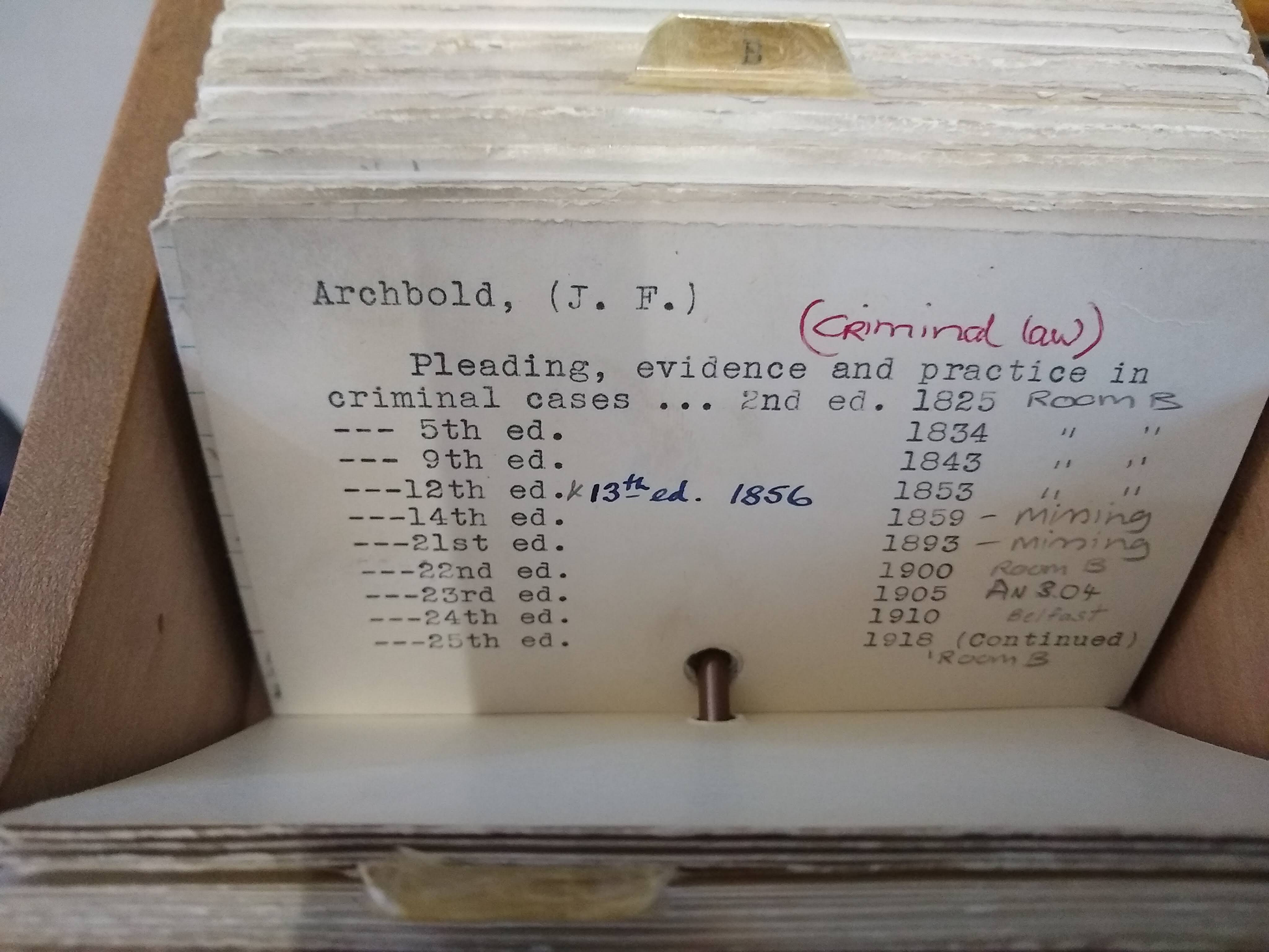
Entry for Archbold in the card catalogue
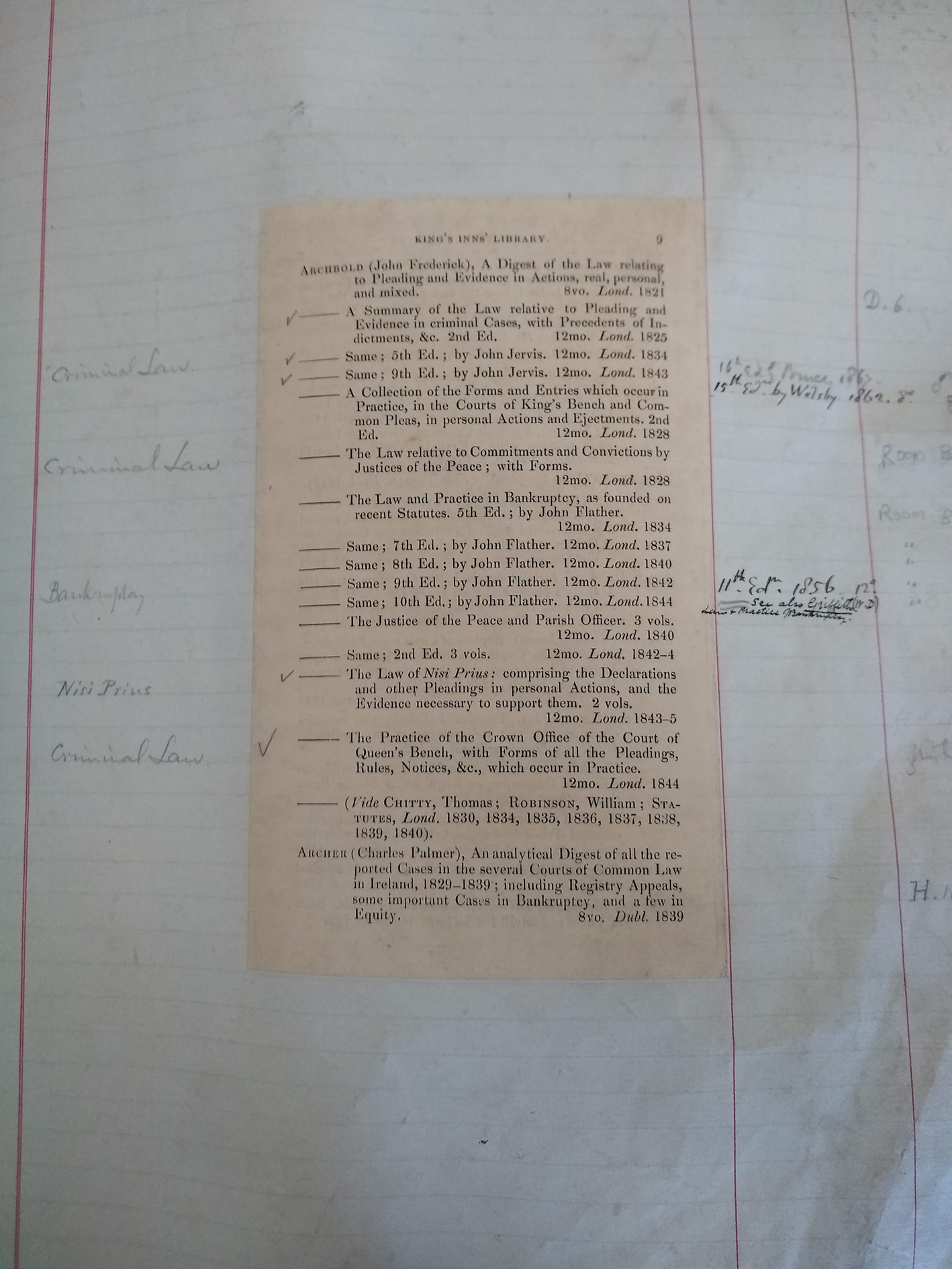
Image of entry of Archbold in bound law catalogue, showing page from printed Juridical Catalogue of 1846 with handwritten entries for later editions on facing page
KING'S INNS ARCHIVE COLLECTION
The archives of King's Inns merit an entirely separate article, however until 1988, when an archivist was first employed by King's Inns, the library and archive collections were inextricably linked. Institutional records, some personal papers and the manuscript collections are now designated as part of the archive collection and are stored in the Library Building. The oldest institutional record is the King's Inns ‘Black Book’. The earliest entries in this 360 folio manuscript date not from the foundation of the Inns in 1541, but from the time of its revival after a period of decline in 1607. It covers the period to c.1730 and includes lists of those admitted to the society, accounts and minutes. It is an important primary source for 17th Century Ireland as many members of the society were political and public figures. From 1792 there are volumes of bench minutes available, and the first printed set of rules of the society.
In addition to the institutional records of the society, there are also the admission papers. Applicants are required to complete a memorial, addressed formally to the Benchers of the Honorable Society, requesting admission as a student and later, seeking admission to the society and to the degree of Barrister-at-Law. These memorials set out full details of name, age, and family background. The admission papers were written by hand in the early years and later filled in on printed forms, and they exist for applicants dating back to the 1750s. These provide a unique primary source of genealogical information.
Alumni of King's Inns have played a key role in public and political milestones in Irish history, including Daniel O'Connell, Theobald Wolfe Tone, Robert Emmet, Patrick Pearse, Edward Carson, Henry Grattan and Mary Robinson. On 1 November 1921 King's Inns admitted Frances Kyle and Averil Deverell to the degree of Barrister-at-Law, and they became the first two women called to the Bar in what was then the United Kingdom of Britain and Ireland.
A small number of personal papers have been bequeathed to King's Inns, including those of Averil Deverell and former Supreme Court judge Cecil Lavery and John Patrick Prendergast. The ‘Prendergast Papers’ are a 14-volume collection of transcriptions of material relating to Cromwellian Ireland, the original materials having been destroyed in the 1922 fire in the Public Records Office of Ireland.
MANUSCRIPTS
King's Inns Library holds over 300 manuscripts, which date from the early 17th Century to the 20th Century, covering both legal and non-legal matters. Henry Monck Mason was appointed Librarian in 1818, and with a great interest in the Irish language and antiquities, he is likely to have been responsible for acquiring many of the library's fine books over the following 30 years, including a collection of Irish language manuscripts. The manuscripts deal with various subjects including poetry, genealogy, religion, and medicine. In recent years the library has benefitted from a collaboration with the Irish Script on Screen project, an open access online resource that has digitised and made available images of Irish language manuscripts to a global audience, increasing accessibility, and contributing to the preservation of the originals.
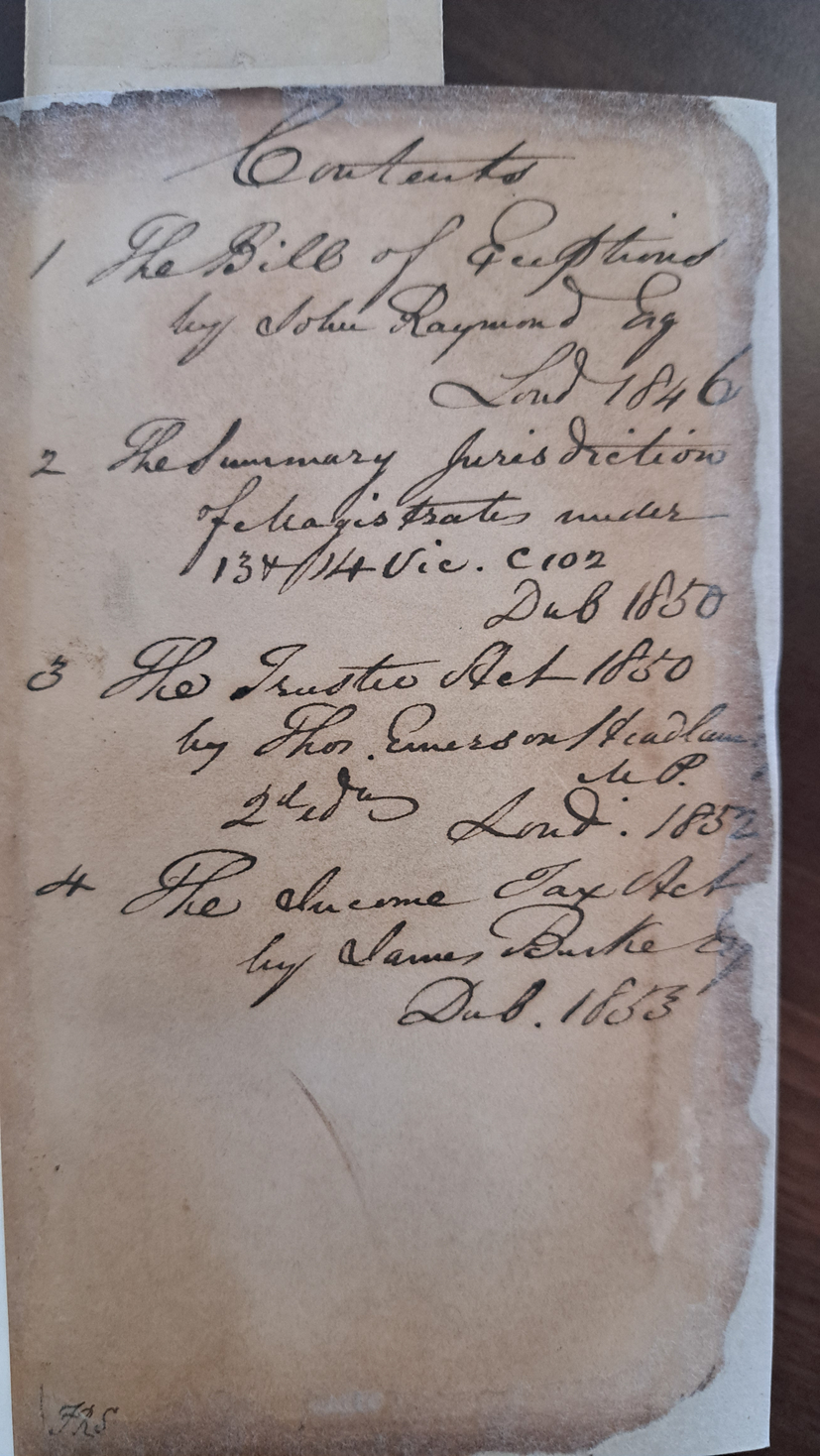
Contents page of a volume of law tracts
The manuscripts covering legal matters include casebooks, abridgements, reports of assizes and law treatises. The volumes contain, for example, copies of decrees in the Irish Court of Chancery (17th / 18th Century); a 17th Century treatise on the practice in the ecclesiastical courts in Ireland; Justice, later Lord Chancellor, O'Hagan's notes (1865-1881); a record of a parliament held at Dublin1613-1615; and reports of Spring Assizes, Tralee from1787. A full listing of all the manuscript collection is available on the King's Inns website.Footnote 3

This is from MS17 which dates from the latter half of 15th Century and is concerned with medical matters, and among the subjects it deals with are laxatives, vomiting, vein-letting and eye ailments. Figures are shown ploughing, digging and threshing
COLLABORATION
Informal and formal collaborations with organisations and initiatives including the Irish Manuscripts Commission, Irish Architectural Archive, Clericus, and Irish Script on Screen, have assisted King's Inns library in extending both the reach of the collection and services to users. Longstanding informal collaborative arrangements with the Bar of Ireland Law Library and Judges Library benefit our shared membership. The library has also benefited greatly from the foundation of the Irish Legal History Society in 1988, not only from knowledge acquired from their publications and members, but recent collaboration has resulted in the publication of The reminiscences of Ignatius O'Brien, Lord Chancellor of Ireland 1913-18: a life in Cork, Dublin and Westminster, edited by Daire Hogan and Patrick Maume.Footnote 4
The library of King's Inns is a participating institution in the Virtual Record Treasury of Ireland.Footnote 5 This resource, which arose from the Beyond 2022 project, re-imagines and reconstructs through digital technologies the Public Record Office of Ireland, destroyed on June 30th, 1922. Materials from King's Inns collection available include a volume of the Encumbered Estates Court Rentals. This lists names of lands and parcels of lands to be sold, their contents, tenants’ names, acreage, historical information including explanations of Irish names, descriptions on demesnes, local statistics, maps and houses.
CURRENT LIBRARY SERVICE
King's Inns Library will continue to evolve to support developments in teaching and learning. The library has successfully adapted to the move to online and hybrid course delivery. The principal activity of the library service is to support the student body, the vast majority of whom avail of the service remotely. The preparation of subject guides and course specific video tutorials is key in the delivery of the remote service. The library has an allocated space on Moodle, the virtual learning environment, to centralise information for students. There has been a notable fall in borrowing from the lending collection over the past four years and a corresponding increase in the reliance on e-book titles. Cases, legislation, and commentary are searched for and retrieved through the subscription and open access online resources.
Professional legal education has seen a move away from a reliance on written assignments to skills-based learning including advocacy and drafting and the collection has been developed accordingly. As a core competency of a practising barrister, legal research is one of the skills required to be demonstrated by students undertaking the Barrister-at-Law degree; library staff support students in showing how to use online resources effectively.
The emergence of Generative AI will necessitate a revaluation, not only of assessment methodology, but also how information literacy is taught, and legal research is conducted. The impact on the scope and priorities of many law libraries, including King's Inns, has yet to be established.
The care and preservation of the historic collection will always be an ongoing concern. Further resources and collaborative initiatives will be needed to assist with revealing the many facets of the historic collection and archives that remain unexplored.


